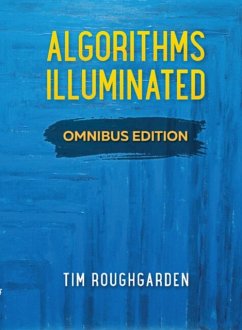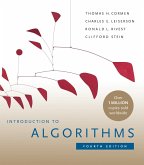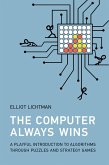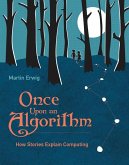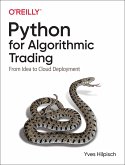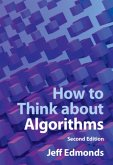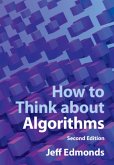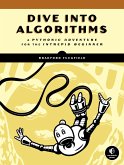- Gebundenes Buch
- Merkliste
- Auf die Merkliste
- Bewerten Bewerten
- Teilen
- Produkt teilen
- Produkterinnerung
- Produkterinnerung
Algorithms Illuminated teaches the basics of algorithms in the most accessible way imaginable, with thorough coverage of asymptotic analysis, graph search and shortest paths, data structures, divide-and-conquer algorithms, greedy algorithms, dynamic programming, and NP-hard problems.
Andere Kunden interessierten sich auch für
![Introduction to Algorithms Introduction to Algorithms]() Thomas H. CormenIntroduction to Algorithms132,99 €
Thomas H. CormenIntroduction to Algorithms132,99 €![The Computer Always Wins The Computer Always Wins]() Elliot LichtmanThe Computer Always Wins13,99 €
Elliot LichtmanThe Computer Always Wins13,99 €![Once Upon an Algorithm Once Upon an Algorithm]() Martin ErwigOnce Upon an Algorithm15,99 €
Martin ErwigOnce Upon an Algorithm15,99 €![Python for Algorithmic Trading Python for Algorithmic Trading]() Yves HilpischPython for Algorithmic Trading55,99 €
Yves HilpischPython for Algorithmic Trading55,99 €![How to Think about Algorithms How to Think about Algorithms]() Jeff Edmonds (Toronto York University)How to Think about Algorithms132,99 €
Jeff Edmonds (Toronto York University)How to Think about Algorithms132,99 €![How to Think about Algorithms How to Think about Algorithms]() Jeff Edmonds (Toronto York University)How to Think about Algorithms28,99 €
Jeff Edmonds (Toronto York University)How to Think about Algorithms28,99 €![Dive Into Algorithms Dive Into Algorithms]() Bradford TuckfieldDive Into Algorithms44,99 €
Bradford TuckfieldDive Into Algorithms44,99 €-
-
-
Algorithms Illuminated teaches the basics of algorithms in the most accessible way imaginable, with thorough coverage of asymptotic analysis, graph search and shortest paths, data structures, divide-and-conquer algorithms, greedy algorithms, dynamic programming, and NP-hard problems.
Produktdetails
- Produktdetails
- Verlag: Cambridge University Press
- Seitenzahl: 690
- Erscheinungstermin: Dezember 2022
- Englisch
- Abmessung: 261mm x 186mm x 48mm
- Gewicht: 1610g
- ISBN-13: 9780999282984
- ISBN-10: 0999282980
- Artikelnr.: 65280637
- Herstellerkennzeichnung
- Libri GmbH
- Europaallee 1
- 36244 Bad Hersfeld
- gpsr@libri.de
- Verlag: Cambridge University Press
- Seitenzahl: 690
- Erscheinungstermin: Dezember 2022
- Englisch
- Abmessung: 261mm x 186mm x 48mm
- Gewicht: 1610g
- ISBN-13: 9780999282984
- ISBN-10: 0999282980
- Artikelnr.: 65280637
- Herstellerkennzeichnung
- Libri GmbH
- Europaallee 1
- 36244 Bad Hersfeld
- gpsr@libri.de
Tim Roughgarden is a Professor of Computer Science at Columbia University. His research, teaching, and expository writings have been recognized by a Presidential Early Career Award for Scientists and Engineers, the ACM Grace Murray Hopper Award, the EATCS-SIGACT Gödel Prize, a Guggenheim Fellowship, the INFORMS Lancaster Prize, and a Tau Beta Pi Teaching Award. His other books include Twenty Lectures on Algorithmic Game Theory (2016) and Beyond the Worst-Case Analysis of Algorithms (2021).
Part I. The Basics: 1. Introduction
2. Asymptotic notation
3. Divide-and-Conquer algorithms
4. The master method
5. QuickSort
6. Linear-time selection
Part II. Graph Algorithms and Data Structures: 7. Graphs: the Basics
8. Graph search and its applications
9. Dijkstra's shortest-path algorithm
10. The heap data structure
11. Search trees
12. Hash tables and Bloom filters
Part III. Greedy Algorithms and Dynamic Programming
13. Introduction to greedy algorithms
14. Huffman codes
15. Minimum spanning trees
16. Introduction to dynamic programming
17. Advanced dynamic programming
18. Shortest paths revisited
Part IV. Algorithms for NP-Hard Problems
19. What is NP-Hardness?
20. Compromising on correctness: efficient inexact algorithms
21. Compromising on speed: exact inefficient algorithms
22. Proving problems NP-hard
23. P, NP, and all that
24. Case study: the FCC incentive auction
Appendix A. Quick review of proofs By induction
Appendix B. Quick review of discrete probability
Epilogue. A field guide to algorithm design
Hints and solutions.
2. Asymptotic notation
3. Divide-and-Conquer algorithms
4. The master method
5. QuickSort
6. Linear-time selection
Part II. Graph Algorithms and Data Structures: 7. Graphs: the Basics
8. Graph search and its applications
9. Dijkstra's shortest-path algorithm
10. The heap data structure
11. Search trees
12. Hash tables and Bloom filters
Part III. Greedy Algorithms and Dynamic Programming
13. Introduction to greedy algorithms
14. Huffman codes
15. Minimum spanning trees
16. Introduction to dynamic programming
17. Advanced dynamic programming
18. Shortest paths revisited
Part IV. Algorithms for NP-Hard Problems
19. What is NP-Hardness?
20. Compromising on correctness: efficient inexact algorithms
21. Compromising on speed: exact inefficient algorithms
22. Proving problems NP-hard
23. P, NP, and all that
24. Case study: the FCC incentive auction
Appendix A. Quick review of proofs By induction
Appendix B. Quick review of discrete probability
Epilogue. A field guide to algorithm design
Hints and solutions.
Part I. The Basics: 1. Introduction
2. Asymptotic notation
3. Divide-and-Conquer algorithms
4. The master method
5. QuickSort
6. Linear-time selection
Part II. Graph Algorithms and Data Structures: 7. Graphs: the Basics
8. Graph search and its applications
9. Dijkstra's shortest-path algorithm
10. The heap data structure
11. Search trees
12. Hash tables and Bloom filters
Part III. Greedy Algorithms and Dynamic Programming
13. Introduction to greedy algorithms
14. Huffman codes
15. Minimum spanning trees
16. Introduction to dynamic programming
17. Advanced dynamic programming
18. Shortest paths revisited
Part IV. Algorithms for NP-Hard Problems
19. What is NP-Hardness?
20. Compromising on correctness: efficient inexact algorithms
21. Compromising on speed: exact inefficient algorithms
22. Proving problems NP-hard
23. P, NP, and all that
24. Case study: the FCC incentive auction
Appendix A. Quick review of proofs By induction
Appendix B. Quick review of discrete probability
Epilogue. A field guide to algorithm design
Hints and solutions.
2. Asymptotic notation
3. Divide-and-Conquer algorithms
4. The master method
5. QuickSort
6. Linear-time selection
Part II. Graph Algorithms and Data Structures: 7. Graphs: the Basics
8. Graph search and its applications
9. Dijkstra's shortest-path algorithm
10. The heap data structure
11. Search trees
12. Hash tables and Bloom filters
Part III. Greedy Algorithms and Dynamic Programming
13. Introduction to greedy algorithms
14. Huffman codes
15. Minimum spanning trees
16. Introduction to dynamic programming
17. Advanced dynamic programming
18. Shortest paths revisited
Part IV. Algorithms for NP-Hard Problems
19. What is NP-Hardness?
20. Compromising on correctness: efficient inexact algorithms
21. Compromising on speed: exact inefficient algorithms
22. Proving problems NP-hard
23. P, NP, and all that
24. Case study: the FCC incentive auction
Appendix A. Quick review of proofs By induction
Appendix B. Quick review of discrete probability
Epilogue. A field guide to algorithm design
Hints and solutions.

